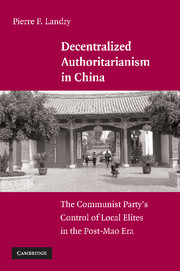 Decentralized Authoritarianism in China
Decentralized Authoritarianism in China Book contents
- Frontmatter
- Contents
- List of Tables
- List of Figures
- Acknowledgments
- List of Abbreviations
- Decentralized Authoritarianism in China
- 1 Authoritarianism and Decentralization
- 2 Organizing Decentralization
- 3 Promoting High-Level Generalists: The Management of Mayors
- 4 Organizational Power: The View from Within
- 5 Explaining Cadre Rank
- 6 The Impact of Village Elections on the Appointment of Party Branch Secretaries
- 7 Conclusion
- References
- Index
1 - Authoritarianism and Decentralization
Published online by Cambridge University Press: 22 July 2009
- Frontmatter
- Contents
- List of Tables
- List of Figures
- Acknowledgments
- List of Abbreviations
- Decentralized Authoritarianism in China
- 1 Authoritarianism and Decentralization
- 2 Organizing Decentralization
- 3 Promoting High-Level Generalists: The Management of Mayors
- 4 Organizational Power: The View from Within
- 5 Explaining Cadre Rank
- 6 The Impact of Village Elections on the Appointment of Party Branch Secretaries
- 7 Conclusion
- References
- Index
Summary
In November 2002, Hu Jintao became the fourth general secretary of the Chinese Communist Party (CCP) of the “reform era,” which began in earnest in December 1978. The carefully orchestrated leadership transition was widely regarded as the most predictable and peaceful transfer of power in the history of the People's Republic. The contrast with the events of the late 1980s that rocked the communist world could not have been greater. When communism ended, first in Eastern Europe, then in the Soviet Union itself, the future of the Chinese regime seemed very much in doubt. The series of demonstrations during the spring of 1989 proved that the CCP was not immune to the kind of political instability that led to the destruction of communism elsewhere. Although by the summer of 1989 the Chinese leadership seemed to have “won,” scholars outside China ascribed the use of force against demonstrators to the desperation of a Party weakened by ten years of reforms; Deng's pyrrhic victory signified a “transition postponed,” but certainly not a precluded one (Shue, 1992; Pei, 1994).
Fifteen years later, the transition has still not taken place. Instead, the post-Tiananmen leadership surprised the world by embracing a breathtaking series of politically difficult reforms: deeper integration with the world economy, culminating with World Trade Organization membership in 2001; the restructuring of the state sector, including massive layoffs; the privatization of much of the housing sector in urban areas; and the generalization of partially competitive elections at the village level.
- Type
- Chapter
- Information
- Decentralized Authoritarianism in ChinaThe Communist Party's Control of Local Elites in the Post-Mao Era, pp. 1 - 36Publisher: Cambridge University PressPrint publication year: 2008
- 1
- Cited by
